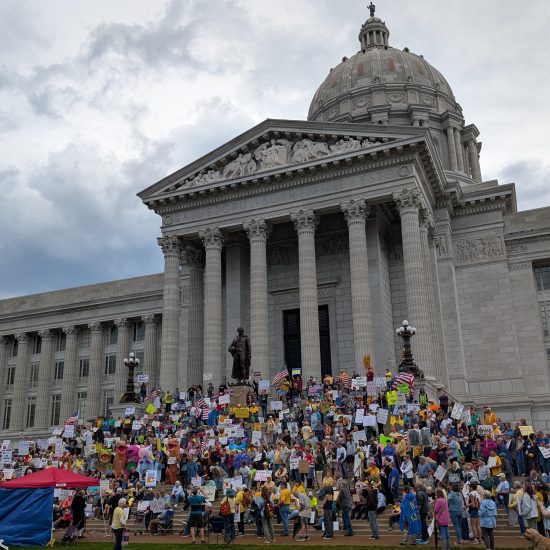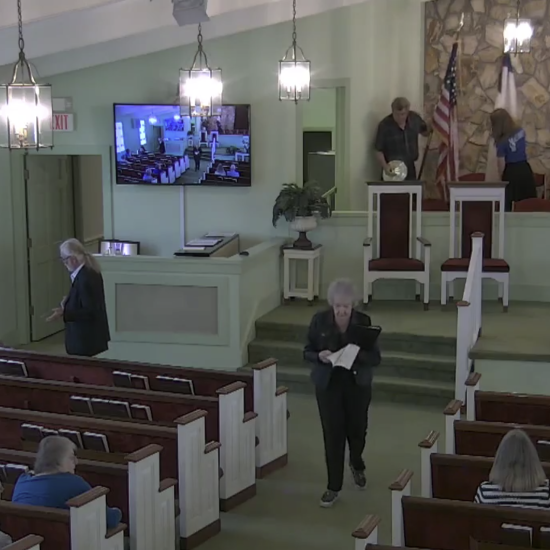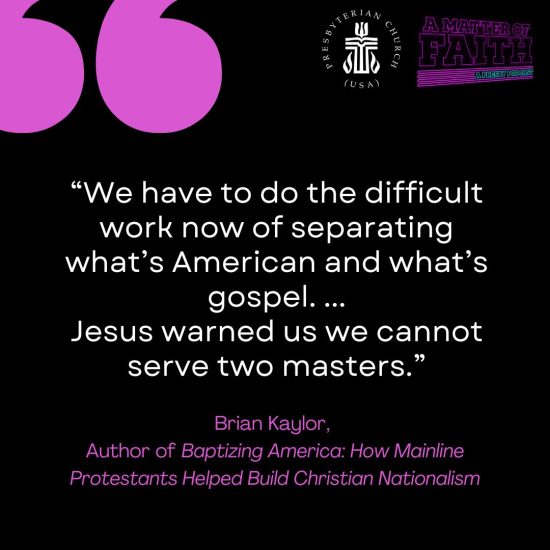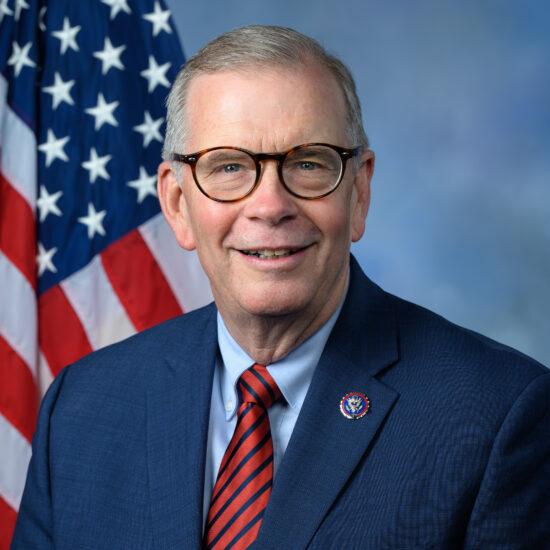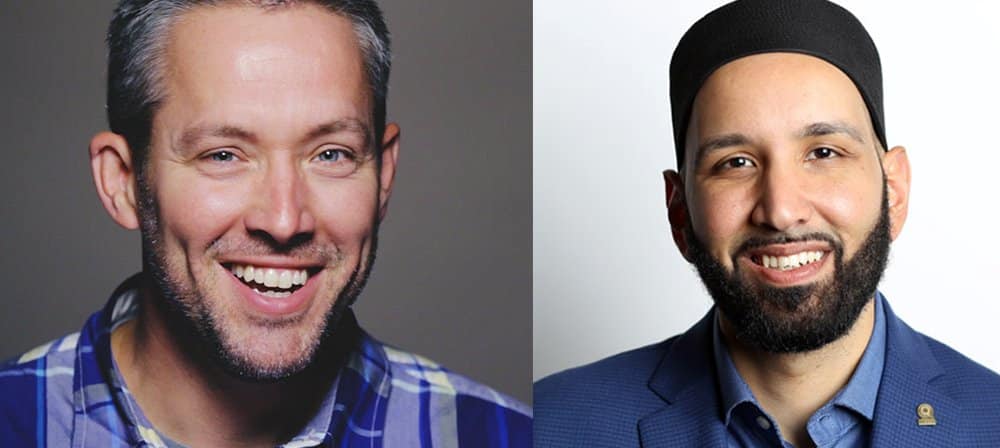

Southern Baptist Convention President J.D. Greear, left, and Yaqeen Institute founder Imam Omar Suleiman will participate in a conversation at North Carolina State University. Courtesy photos
(RNS) — This week more than 500 evangelical students will hear Southern Baptist Convention President J.D. Greear and Yaqeen Institute founder Imam Omar Suleiman discuss how evangelicals and Muslims can find a way forward “in a time of unprecedented division and distrust.”
The conversation, hosted by the Veritas Forum, will be held Thursday (March 5) at North Carolina State University and is co-sponsored by the school’s Muslim Students Association, its Cru and InterVarsity clubs, and Neighborly Faith, an organization focused on transforming evangelicals’ attitudes toward Muslims.
“We’re trying to host what some might see as an unlikely conversation to be had in such a public forum, when we think about how isolated these communities have historically been from one another in our country, particularly since 9/11,” said Neighborly Faith director Kevin Singer, who is a doctoral student at the school and will moderate the discussion.
(Disclosure: Both Singer and Suleiman are contributors to Religion News Service.)
Most of the attendees will be deeply conservative evangelical students who likely have never held a conversation with a Muslim before and do not have Muslim friends, Singer noted.
“They probably don’t know how to have a mutually beneficial conversation with a Muslim in a way that feels faithful, so we’re hoping to show a model of charitable discourse that maintains conviction,” he said.
Being on a Southern campus, Singer said, the event may end up addressing some “cultural notions about Islam within the Christian faith and in this particular region.”
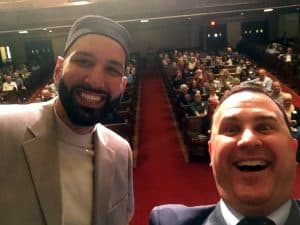
Imam Omar Suleiman, left, with Rev. Andy Stoker at First Methodist Church in Dallas. Photo courtesy of Omar Suleiman
Suleiman told RNS he feels well-equipped to address such misconceptions: Having grown up in New Orleans and now living in Dallas, where he teaches Islamic studies at Southern Methodist University and often meets with evangelical leaders both in public and in private, Suleiman says he is intimately acquainted with Southern church life.
A prominent activist for civil rights and interfaith issues who is known for denouncing extremism, Suleiman has faced hostility from multiple sides, including threats from the Islamic State group. Commentators from the Christian right such as pastor Robert Jeffress have criticized him, as well.
So far, the imam said, the response to the event has been positive, with the exception of a stray social media comment.
Suleiman said he hopes the minority of Muslim students in the audience will glean something from the conversation, too.
“A lot of times we shy away from spaces where we think we won’t be welcomed in the fullness of ourselves as Muslims, but if we speak to the beautiful themes in our religion then that will resonate with people,” he said. “If we want to be bridge builders, we need to be consistent in our call for bridge building. We can’t only build bridges with people we’re comfortable with. We have to get over this apprehension that if we talk to people that we don’t agree with on everything, then we’ll lose what makes us unique as Muslims.”
Suleiman said such a public event, with a Muslim leader on stage beside a significant evangelical figure like Greear, sends a critical message of hope to both communities about the “possibility for dialogue.”
Greear is lead pastor of The Summit Church in Durham, North Carolina, and as head of the SBC he also serves the denomination’s 50,000 Southern Baptist member churches across the country. Having spent two years as a missionary among Muslim communities in Southeast Asia, Greear is also the author of the 2010 book “Breaking the Islam Code: Understanding the Soul Questions of Every Muslim.”
“We love our Muslim neighbors and want to fight alongside of them for respect, freedom and civility in our communities,” Greear told RNS. “We believe the gospel of Jesus Christ provides a unique and compelling hope in a chaotic world and are excited to represent the distinctive message of Jesus in the marketplace of ideas.”
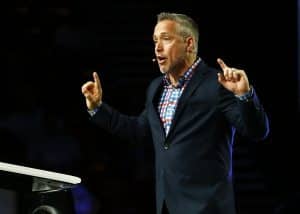
SBC President J.D. Greear speaks during the annual meeting of the Southern Baptist Convention at the BJCC, June 11, 2019 in Birmingham, Ala. RNS photo by Butch Dill.
The school’s Muslim and Christian student organizations have held some previous events in the past, including a small roundtable discussion as well as a large debate that Singer said “didn’t seem to create a sense of goodwill between the faiths on campus.”
The Veritas event will be the first large-scale conversation event between the campus’s evangelicals and Muslims based on “collegial dialogue” rather than supremacy, he said.
Organizers also plan to interview Muslim and evangelical students before and after the event to measure whether attitudes toward the other faith group changed. Singer said college campuses are fertile ground for such change, which is critical for the future of evangelicalism in the U.S.
“That’s where our next generation of leaders are,” Singer said. “If evangelicals can’t speak to other faiths in ways that are intelligible and charitable, we don’t stand a chance in a pluralistic society. We want to see the next generation get this right.”
Already, he said, he’s seen that most evangelical students show a “natural curiosity” about Muslims because of the way previous generations have “alienated themselves” from Muslim communities.
“They naturally get into conversations with Muslim students in the cafeteria and in residence halls, and they’re realizing, ‘Hey, you really care about your faith, too. It actually seems like we’re finding a similar enemy here, which is secularism, and the belief that religious people are crazy, and people who are religious are behind the times or dinosaurs, socially speaking,’” Singer said. “And I think they’re realizing we have a lot more in common than we realize, even if we deeply disagree on many issues.”
The event will be livestreamed. Organizers expect 500 to 1,000 students and community members to attend. Local churches and campus ministry organizations have also been invited.
On campuses around the country, Veritas Forums aim to help Christian students with orthodox beliefs better understand their own worldview in comparison with others while discussing issues related to morality, purpose and faith.
However, the nonprofit’s founder, the once-mainstream evangelical author Kelly Monroe Kullberg, has been linked to a Facebook astroturfing campaign spreading extreme anti-Muslim conspiracy theories. Several Facebook pages in Kullberg’s network were posting messages denouncing “Shariah supremacy” after Suleiman delivered an opening prayer in the U.S. House of Representatives last year, part of a deluge of hate speech aimed at the imam after the event. Kullberg is no longer part of Veritas’ staff or board.

